WIT’s Director, Professor Carlos A. Brebbia, opened the ceremony by thanking all present for coming and congratulating the candidates on their excellent performances. The external examiners were most complimentary of the work carried out by them, which reflects well on the Institute.
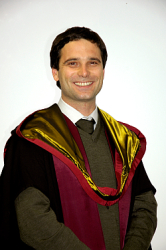
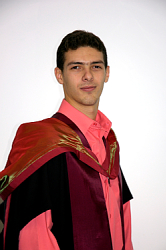
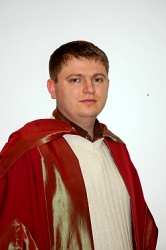
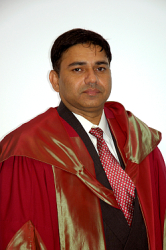
(From left to right: Nino Bozic, Oleksandr Adamov, Taras Grytsenko and Sirajuddin Ahmed)
Nino Bozic The first MPhil graduate was Nino Bozic from the University of Split in Croatia who wrote a thesis on the “Assessment of Maximal Magnetic Flux Density Value from a Power Substation”. In his work, Nino addressed the electromagnetic field values from power substations which are of current interest to both power utility companies and the general public. His work provides a procedure for finding the maximal negative field from substations using an approximation based radial basis function which is capable of handling multidimensional functions by interpolating their non-uniformly scattered data accurately. Nino’s work takes into account low frequency bio-electromagnetic effects and the corresponding existing guidelines for limiting doses of human body exposure to electromagnetic fields. This, explained Professor Brebbia, is work of considerable practical importance and of outstanding quality in a Master thesis.
Oleksandr Adamov
The second MPhil thesis was on “Design Methodology for Functional Verification of System-on-Chip Models” by Oleksandr Adamov from Kharkiv National University. The basis of his research was the need to introduce novel system approach in the design and verification of System on Chip models, which integrate many blocks including peripheral IPs, buses, complex interconnectors, multiple processors, memory and clocks. The objective of Oleksandr’s research was to create effective methods for functional verification at system design level, which represents a new high-potential line of work. The candidate analysed the performance of existing verification methodologies and developed a new algorithm. The resulting method was tested against experiments opening a new pioneering field of future research.
Taras Grytsenko
Taras Grytsenko, also from Kharkiv National University, successfully passed his PhD viva based on his thesis “Adaptive Cross Approximation applied to large scale problems in Boundary Element Method”. As is well know, Professor Brebbia explained, the classical Boundary Element Method (BEM) yields large non-symmetric systems of equations which put it at a disadvantage against methods such as Finite Elements, based on sparse matrices. The advantages of BEM against FEM however are considerable as it avoids internal discretisation and produces more accurate results. Because of that, it is essential to develop methods to handle large scale models and in that way increase the use of BEM to solve complex industrial problems with many degrees of freedom.
Taras applied the Adaptive Cross Approximation (ACA) algorithm and hierarchical matrices. This combination, in conjunction with novel algorithms made both the calculation complexity of the matrix-vector manipulations and the storage requirements to be linear.
Taras’ work demonstrated that the ACA solver offers an algebraic alternative to the well established Fast Multipole Method, a fact that is demonstrated by comparisons shown in the thesis. A number of industrial examples aimed at showing the applicability of the methods developed are also given in the thesis. BEM models involving up to 150,000 unknowns have been successfully solved with several minutes on a stand alone desktop PC.
Sirajuddin Ahmed
The last of the successful theses was also for a PhD degree. It was on the topic of “Optimization of constructed wetlands treatment system for sub-tropical and tropical climatic conditions” by Sirajuddin Ahmed of Jamia Millia Islamia University in New Delhi. The different topic of the research underlines the broad spectrum of work carried out at the Wessex Institute. In this case, the subject is of direct applicability and extremely important for a large number of developing countries.
Rapid urbanisation has given rise to independent environmental health problems in developing countries. It is essential to safeguard public health by curtailing the contamination of water boundaries by industrial and domestic waters. Untreated waste water can readily mix with and pollute surface and groundwater resources. The resulting polluted waters, when consumed by humans, animals and plants can render the vulnerable to diseases and ailments.
The majority of countries in the tropical and sub-tropical regions are confronted by the twin problems of high growth and urban population and scarcity of financial and material resources to meet the ever-growing demands for better water supply and sanitation facilities.
Ahmed’s thesis draws extensively on the research conducted in this area and suggests how constructed wetlands can be adapted as ideal alternatives for wastewater treatment since these have been found to be more environment-friendly, simpler to operate and comparatively more cost-effective than the conventional treatment systems.
A series of experimental studies were carried out over a period of 18 months in a specially designed subsurface constructed wetland pilot plant in the sub-tropical climate of Delhi. Experiments were carried out over a wide range of operational and climatic variables and the removal performance of important parameters like suspended solids, BOD, COD, nutrients, metals and pathogens were studied.
The complex process involved in the purification by these wetlands cannot be completely represented by advection diffusion equation with constant coefficients. A new approach, based on the modified advection diffusion equation model, was developed taking care of the dynamic nature of bio-decay rate and changing value of pore-water velocity due to evaporation.
Each of the graduates ended by giving a short address thanking all those involved in making a success of their stay at WIT. This was followed by short speeches by the supervisors and a final word of thanks from Professor Brebbia to all of them for trusting the Wessex Institute with their research education. He hopes that they will help to attract some of their colleagues to collaborate with WIT and that they themselves will always feel part of Ashurst Lodge.
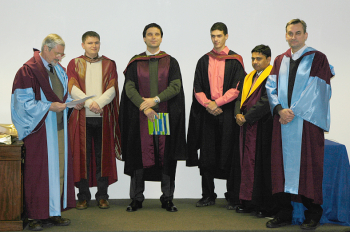

 Wessex Institute
Wessex Institute